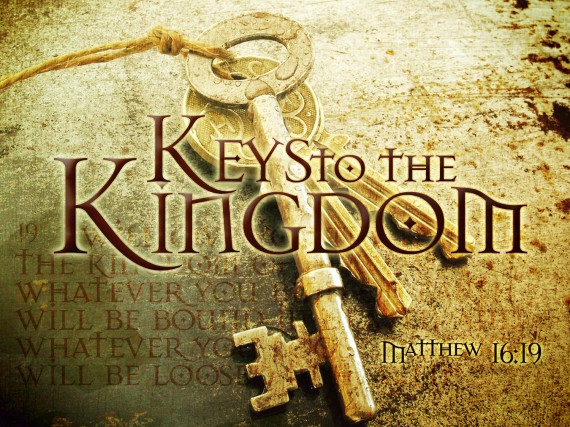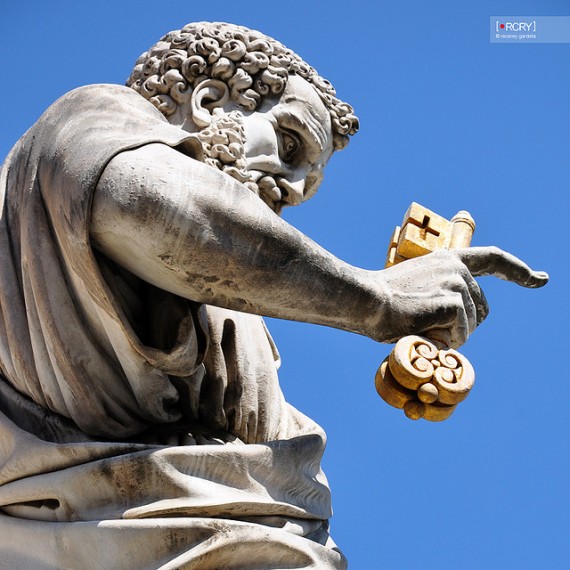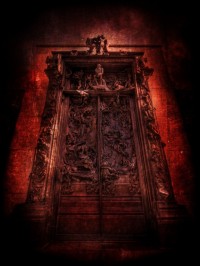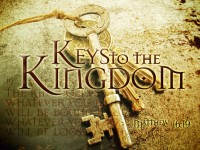
Lots of churches and church leaders want to use Matthew 16:19 and Jesus’ statement to Peter about the keys of the kingdom of heaven as justification for judging and condemning others for their beliefs or their behavior. We saw yesterday in my post about Locking Others out of Heaven that there are two main views about Matthew 16:19.
Some think that we do have this authority, or at least, some church leaders (such as the Pope) have it. When a decision is made by the church, or one of these select leaders, Jesus “rubber stamps” it from heaven.
The other main view is based off the “periphrastic future-perfect passive participles” of the verse, and says that the decisions which are made on earth, are decisions that have already been made in heaven, and we are simply implementing these decisions here.
Theological Magic Shows
I suppose that when it comes to translating the verse, I side with the “periphrastic future-perfect passive participle” view.
But frankly, with my understanding of the verse, it really doesn’t matter too much how you translate the words, or whether you know what a “periphrastic future-perfect passive participle” is.
I am convinced that most of the big theological debates in church history are a result of theological sleight of hand. It’s like in a magic trick when the magician is waving one hand about, with lots of color, light, and flourishes, that is the time to watch what his other hand is doing. If he says, “Look over there at my beautiful, scantily clad, periphrastic future-perfect passive participle partner!” that is the time to look the other way, and see what is happening on the other side of the stage.
When it comes to Matthew 16:19, the events on the other side of the stage is the phrase “Kingdom of heaven.” Most of the lights and fireworks of the debate surrounding Matthew 16:19 have focused on who Jesus is speaking to, whether it applies to the church or not, and how to translate the “periphrastic future-perfect passive participles.”
Almost nobody asks what Jesus meant by “Kingdom of heaven,” which is where the solution to this verse lies.
What is the Kingdom of Heaven?
The kingdom of heaven is not the same thing as “heaven.” Nor is the kingdom of heaven a kingdom that is in heaven. It is not a kingdom that will begin at some point in the future. No, the kingdom of heaven is the kingdom that is ruled by heaven. It is the kingdom that has many of the same rules, characteristics, and traits as heaven. The kingdom of heaven is any part of the universe that falls under the jurisdiction of heaven.
This idea fits well with what Jesus says about binding and loosing in Matthew 16:19. He is saying that the laws and decisions which have been in effect in heaven are now coming to earth. What has been bound and loosed in heaven, will now also be bound and loosed on earth.
Ultimately, the mission of the church is to bind and loose on earth what has already been bound and loosed in heaven. This mission began with Jesus, and He passed the mission on to the apostles, and specifically in Matthew 16:19, to Peter. Later, this mission was passed on to the church in general.
But there is no idea here of apostolic succession from Peter to the Pope. Jesus does not say that He is giving the keys of the kingdom of heaven to Peter and to all who follow Peter, or to all future church leaders, or even to the church itself. What Jesus says to Peter was a task for Peter alone.
And what was that task?

The Task of Peter
Jesus gave spiritual keys to Peter: keys of the kingdom of heaven.
And what are keys good for? They open doors. They unlock gates. What gates?
In the immediately preceding verse, Matthew 16:18, Jesus talked about some particular gates: the gates of hell.
I will write a lot more about Matthew 16:18 in a future post, but for now, note that it is not the gates of hell which are attacking the church. Gates are not built for offensive purposes, but only for defense. The gates of hell are trying to stand against the invading church. Jesus is saying that the church will storm the gates of hell, and since Peter has the keys of the kingdom of heaven, the gates of hell will not stay locked. It will not even be that much of a siege, since Peter can simply walk right up and unlock the gates.
The task of Peter is to unlock the gates of hell.
The Gates of Hell
And what is behind the gates of hell?
Only one thing: people.
 Jesus is not referring to a place of eternal conscious torment, but rather, a life of spiritual bondage to sin. Locked up behind the gates of hell are people on this earth who have been enslaved to sin and Satan, and one of the primary tasks of Jesus and His church is to set these people free, to proclaim liberty to the captives, and set free those who are oppressed (Luke 4:18). If they do not escape the gates of hell, they will spend this life and eternity in hell. But when the gates of hell are opened with the keys of the kingdom of heaven, the people who were trapped inside can now come out from oppression and bondage, and enter into the freedom and joy of the kingdom of heaven.
Jesus is not referring to a place of eternal conscious torment, but rather, a life of spiritual bondage to sin. Locked up behind the gates of hell are people on this earth who have been enslaved to sin and Satan, and one of the primary tasks of Jesus and His church is to set these people free, to proclaim liberty to the captives, and set free those who are oppressed (Luke 4:18). If they do not escape the gates of hell, they will spend this life and eternity in hell. But when the gates of hell are opened with the keys of the kingdom of heaven, the people who were trapped inside can now come out from oppression and bondage, and enter into the freedom and joy of the kingdom of heaven.
The Apostle Paul in his letters, referred to this barrier not as the gates of hell, but as the dividing wall of hostility (Eph 2:14). He indicates that those who were behind the wall had no hope and were without God in the world, but this wall was broken down so that the two people groups on earth, the Jews and Gentiles, could become one new people group, the church. The church as the new people of God who follow Jesus into the world, declaring, proclaiming, and revealing a new way of living according to the ways of the kingdom of heaven.
So all of this is what I think Jesus meant when he gave the keys of the kingdom of heaven to Peter.
But if they were for Peter’s use, to open the gates of hell, did Peter use them? If so, where? When? How? I will answer these questions tomorrow.




This is the best understanding I’ve heard on this passage. It lines up well with the writings of Paul. Thanks for sharing….it does kind of make the debate on tense moot. 🙂
I look forward to reading your further thoughts.
Thanks, Katherine.
Thanks for sharing. It prompted a fresh read of the passage. I can now picture a gate between the kingdom of darkness (realm of the dead – Hades) and the kingdom of light. Peter is given the key to the kingdom of heaven so he can open it and bring people into the kingdom of God, or into the reign of God.
Hmm… not 100% sure I’ve got this one all figured out, but I think it makes more sense than how I’ve read it in the past.
I think this fits well with what I have been learning about the good news of the kingdom of God that Jesus and his disciples frequently preached. Thanks.
Jon,
That is the way I picture it as well, and the kingdom of darkness vs. the kingdom of light image fits well with other New Testament passages … e.g. Colossians 1:13.
It is me again. I like your interpretation of this verse. However, I think a more complete one is available looking at the entire passage Matthew 16:15-19. Starting with 16, we see Peter answering the question, confirming Jesus as both the Son of God (divine) and the son of God (heir to the throne of David). Then Jesus replies with the ever contentious (since the orthodox split at least) verse “You are Peter and upon this rock I will build my Church, and the gates of hades will not prevail against it”. Moving past that he says, ” And I will give to thee the keys of the kingdom of heaven. And whatsoever thou shalt bind upon earth, it shall be bound also in heaven: and whatsoever thou shalt loose upon earth, it shall be loosed also in heaven.” So, like you indicate, this phrasing “the keys to the kingdom of heaven” is interesting. But I think the “key” to unlocking it lies not in the gates of hell, but in the fact that Jesus just declared himself to be the Divine King of the line of David. So looking back at the structure of the Davidic Kingdom, we can actually see a reference for these keys, In fact, Jesus seems to be quoting Isaiah 22:22 (the parallel in structure makes this pretty sure), which discusses the prime minister of the kingdom. The man who is second only to the King and rules with the authority of the King in his absence. The Jews would have seen this connection immediately. Whats more, Jesus doesn’t quote it exactly, he changes opening and shutting to binding and loosing. This is important because these are Judaic legalistic terms used at that time for determining moral right and wrong. So to run through the whole passage together, it seems that what is happening is this. Peter: You are God and the King of the Line of David. Jesus: My Father revealed this to you. You are to be the foundation of the church I will found. I name you my Prime Minister, giving you the authority of the Kingdom of Heaven (because he is God and King and the Prime Minister rules with the kings authority), and this specifically applies to determining moral right and wrong. I apologize for the length of this post, but I just drank a monster and am looking for ways to distract myself from studying. P.s. I am not saying Isaiah 22 is a prophecy for Peter, but it outlines the role of the Prime Minister pretty well.
I completely agree about the parallel with Isaiah 22:22, but I am not sure what it has to do with the point I am arguing in this post. I have no problem with the view that Jesus was giving the keys of the Kingdom to Peter. I state as much in the post. I suppose that what you may be missing is a link to the follow-up post where I explain when, where, and how Peter used this key. Here is that post: How Peter Used the Kesys of the Kingdom
As to your claim about the keys being used to determine moral right and wrong, I don’t see that anywhere in Matthew 16 or Isaiah 22, and although the Jewish people may have understood this as referring to such judgments, they understood then (and even today) that moral judgments are made by God alone and through a proper understanding of what God has said in Scripture. Again, this is partly what we see Peter doing in the book of Acts (which I write about in that post linked to above).
The citations for the idea of “Binding” and “Loosing” being Jurisdicational and legalistic terms for determining right and wrong are here: The Illustrated Bible Dictionary (Tyndale House publishers), Old Testament Light (Harper and Rowe), and Word Studies in the New Testament ( Marvin R. Vincent), George Lamsa (aramaic scholar protestant writer), to name a few, there are many more.
Thanks for the references. I have most of those, and can look it up.
My ideas about ‘Keys of Kingdom of Heaven’: Two keys refers to the bride and bridegroom. If they were bound on earth then they will also bind in heaven. If they were loosed on earth then they will also loose in heaven. The right pair of each key should be given only by God, we can understand this by Adam and Eve creation. And the bondage between bride and bridegroom is only THE GOD. Satan or evil power always try to separate every pair of keys. So be careful. And our Aim should be to get the ‘Kingdom of Heaven’ by God. Always be a true Christian by believing and loving our God.
Your opening pic is great. What is the name of the font you used for the words on it? I’d really like to get it.
I agree with many of your ideas here. I think what you’re saying about unlocking the gates of hell is much to the same effect as allowing people the chance to get on the road to Heaven. Good stuff.
Thank you for sharing this. I haven’t thought of this as offensive and gates as defensive before. Very interesting!
Also, it would really help if you are doing a series to link them together or at least “next article” button. I read the first post, took forever trying to find the blog, archives, eventually found the search button and made a guess which “Matthew 16:19” post would be next in the series. All to say, I am not expecting to find what you think next as it was hard to find the previous one. Just some feedback you might want to know to help your readers. 🙂